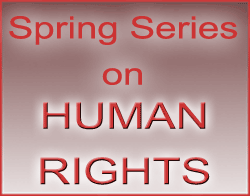
With 2004 marking the end of the United Nations Decade for Human Rights Education, The Center for Ethics is sponsoring a spring series dedicated to the examination of human rights throughout the world. Muhlenberg has historical ties to the protection of individual liberties. In 1789, Frederick Augustus Muhlenberg, Speaker of the House of Representatives at the time, was among the first people to sign the Bill of Rights. For a copy of the Universal Declaration of Human Rights, written in 1948, follow this link to the United Nations Office of the High Commissioner for Human Rights.
Other web sites related to human rights
Carnegie Council on Ethics and International Affairs
Human Rights Watch
Amnesty International
Robert F. Kennedy Center for Human Rights
All of the events listed below are free and open to the public.
Andras Riedlmayer
"Burned Books and Blasted Shrines: Documenting War Crimes Against Cultural Heritage in the Balkan Wars of the 1990s"
Thursday, January 29 • Baker Center for the Arts, Recital Hall • 7:00 p.m.
Andras Riedlmayer served as an expert witness for the U.N. in the trial of Slobodan Milosevic and helped to document the systematic destruction of libraries, historical archives and houses of worship as part of "ethnic cleansing" in the 1992-1995 Bosnian war and in the 1998-1999 conflict in Kosovo. In this slide presentation, he will discuss the implications of these losses to the affected communities and international efforts to bring those responsible to justice and to remedy some of the losses.
Film: Death and the Maiden with an introduction by Professors Anna Adams (History) and Joan Marx (Spanish)
Thursday, February 5• Recital Hall • 7:00 p.m.
The 1994 film directed by Roman Polanski, starring Sigourney Weaver and Ben Kingsley, is an adaptation of an award-winning play by Ariel Dorfman, a Chilean writer forced into exile in 1973. Set in an unnamed country, the film tells the story of Paulina, a woman who had been a political prisoner of a fascist government. Years later, a man whose car has broken down arrives at her home asking for assistance. Paulina recognizes his voice, believing him to be the same man who had tortured her during her captivity. Now Paulina has the unusual opportunity to turn the tables on her former abuser, a situation that also draws in her husband, a lawyer appointed to a commission investigating the human rights atrocities committeed by the regime. The film explores not only the lingering psychological effects of human rights abuses, but also deep ethical questions about retribution and forgiveness.
Dimon Liu
"How I Became a Human Rights Activist"
Wednesday, February 11• Miller Forum, Moyer Hall• 7:00 p.m
Dimon Liu was born in China, and left for the United States as a child at the height of the Cultural Revolution in 1965. She has been an activist on human rights in China beginning in1972, after witnessing appalling conditions during her three-month trip to China after President Richard Nixon's visit. She has testified before the U.S. House and Senate on human rights in China, and in 1989 her activism helped to achieve an unprecedented UN reprimand against China on human rights abuse. Her writings on human rights, rule of law, democracy, and military strategy have appeared in many journals and newspapers including Asian Wall Street Journal , Foreign Affairs , New York Times , Newsday , and Washington Times . Liu's visit is co-sponsored by the Woodrow Wilson Visiting Fellow program.
Antonio Martinez "Human Rights Dilemma in the Americas: A Systems View"
Monday, February 16• Miller Forum, Moyer Hall• 7:00 p.m
Dr. Antonio Martinez is a trained psychologist who has many years experience counseling victims of torture and human rights abuses, and is co-founder of the Marjorie Kovler Center for Survivors of Torture and president of The Institute for Survivors of Torture and Human Rights Abuses, both in Chicago. Having gained a world-wide reputation as an expert on the treatment for survivors of torture, he was a consultant to Glenn Close who acted in the play "Death and the Maiden," an adaptation of the novel by Ariel Dorfman.
John Trudell and Bad Dog Concert
Thursday, February 19th • Empie Theater• 7:30-9:00p.m.
John Trudell, spoken word artist, and critically acclaimed musician, has also been an advocate for environmental justice and human rights, particularly for Native Americans. Trudell, of Santee Sioux descent, was the national chairman of the American Indian Movement from 1974-80. During that time the F.B.I. amassed a file on Trudell of over 17,000 pages released under the Freedom Of Information Act in 1986. Trudell's 1986 release , John Trudell: AKA Graffiti Man , was described by Bob Dylan as the best album of the year. Since then, Trudell has released four more acclaimed C.D.s, including his most recent, Bone Days . The concert, a fundraiser for the Lakota Fund, is free and open to the entire campus. Other campus departments and offices sponsoring the concert include Muhlenberg Activities Council, Student Activities, Humanities Seminar, Multicultural Life, Development and Alumni Relations, Community Service, Office of the Chaplain, Lectures and Forums, Admissions and Student Council.
For more information, please contact Dr. Gary Jones, 484-664-3544.
Jennifer Harbury, Human Rights in Latin America
Monday, February 23 • Miller Forum, Moyer Hall• 7:00 p.m
A human rights activist and attorney, Jennifer Harbury has worked to expose the role of the CIA in human rights violations in Latin America, especially in Guatemala. Harbury became particularly active and visible upon the disappearance and murder of her husband, a Mayan resistance leader, at the hands of CIA-paid Guatemalan officials in the early 1990s. She has also helped to advocate for native Americans in the United States whose rights have been violated. She is the author of two books, Bridge of Courage: Life Stories of the Guatemalan Compañeros and Compañeras (1995) and Searching for Everardo: A Story of Love, War, and the CIA in Guatemala .
Kanan Makiya , "The Politics of Human Rights in Iraq Today"
Wednesday, February 25 • Miller Forum, Moyer Hall • 7:00 p.m
Kanan Makiya is the Sylvia K. Hassenfeld Chair in Islamic and Middle Eastern Studies, Brandeis University, and also serves as Iraqi National Congress delegate to the Constitutional Committee. Professor Makiya left Iraq to study architecture at MIT. In 1981, he left the practice of architecture to write a book on Saddam Hussein's repressive regime, Republic of Fear , which became a best seller after the Iraqi invasion of Kuweit. In 1992, he acted as the convener of the Human Rights Committee of the Iraqi National Congress, a transitional parliament based in northern Iraq. Since then he has worked closely with the Iraqi political and intellectual elite opposed to Saddam's regime and has briefed the current U.S. administration on issues relating to American policy toward Iraq. He is an active participant in drafting the democratic constitution of post-Saddam Iraq and has established the Iraq Memory Foundation, which is working to create a museum that will commemorate the victims of torture and execution committed during three decades of Baath party rule.
Peggy Healy, Human Rights in Latin America
Wednesday, March 24 • Recital Hall • 7:00 p.m.
Peggy Healy teaches human rights law at Fordham University, and has been a longtime human rights activist. After the murder in 1980 of four of her fellow religious workers in El Salvador, Ms. Healy was a strong spokesperson against the brutal repression of the people of El Salvador and the role played by the United States in assisting the right-wing regime. She has testified before Congress against U.S. policy in Central America, served as a consultant to several human rights programs, and appeared on such shows as 60 Minutes and Good Morning America .
Dr. Christopher Kovats-Bernat, HUMAN RIGHTS IN HAITI: Felling Trees and People in the Nightmare Republic
Tuesday April 6 • 3:00PM—4:30PM • Seegers Union Rooms 108 & 109
This slideshow presentation and talk by Professor Christopher Kovats-Bernat, Department of Sociology & Anthropology, will focus on the human and environmental causes and consequences of the current civil war raging in Haiti. Drawing on his March 2004 fieldwork in the slum neighborhoods that have seen the worst of the fighting, Dr. Kovats-Bernat will discuss the ecological and cultural roots of Haitian violence, and explain how the current armed struggle has only served to accelerate the Caribbean country's descent into famine, chaos, and disorder. He will also present information about a raffle to be held on behalf of ZANMI LASANTE, a clinic project in rural Haiti. Light refreshments will be served.
Letter Writing Day for Amnesty International
Thursday, April 15 • Seegers 108-109 • 12:00-5:00 p.m.
Come find out about the work of Amnesty International and join members of the College community in writing letters to ask for the release of prisoners of conscience. Student assistants will be on hand to explain the individual cases and to assist with questions of protocol in the letter writing. For more information about the work of Amnesty International, go to the website. (www.amnesty.org).

